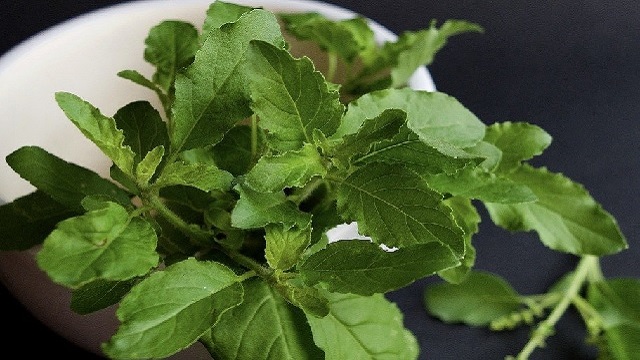Health Benefits of Tulsi & How It Helps in Improving Immunity System
Tulsi is also known as holy basil and is a very popular herb in the Indian subcontinent. However, even though they come from the same Lamiaceae family, tulsi and basil are two different plants. Thanks to its enormous medicinal properties, many call tulsi as the “queen of herbs,” too. It is primarily originated from India and widely cultivated in the entire Southeast Asian region.
From the very ancient time, people regarded tulsi as a sacred plant in the Hindu religion and Ayurveda system of medicines. It is believed to have medicinal properties that can protect humans from several infections and other diseases involving the liver, heart, kidney, and skin.
There are three types of tulsi plants that can be found in India – Ram Tulsi (bright green leaves), Krishna Tulsi (purple-green leaves), and Vana Tulsi (wild tulsi).
Tulsi leaves contain impressive nutritional values with loads of A, C, and K vitamins plus calcium, potassium, phosphorus, magnesium, and iron. It is further packed with fiber and protein as well.
Health Benefits of Tulsi
Antipyretic and analgesic
Tulsi comes with natural anti-viral and anti-bacterial properties that prevent infections. Fresh tulsi juice can reduce fever caused by the seasonal flu or the common cold. Another preparation using tulsi can be highly effective in lowering the temperature. The preparation is easy to make – first, you need to boil fresh tulsi leaves and cardamom together in half liter water. Once the liquid comes to room temperature, mix some honey in it. Tulsi also contains a terpene called Eugenol. This compound has analgesic properties that help to relieve body pain and muscle aches.
Offers relief from cold, cough, and other respiratory discomforts
Ingredients like Eugenol, Cineole, and Camphene in tulsi leaves reduces symptoms of cold, chest congestion, and other disorders in respiratory tracts. Tulsi leaves juice mixed with ginger, and honey provides relief in various ailments, including flu, asthma, and bronchitis.
Can be useful as a stress reliever
Tulsi comes with two specific compounds named Ocimumosides A and B. Researchers found them to be powerful anti-stress agents. They can reduce stress by maintaining balanced levels of two neuro neurotransmitters in our brain – dopamine, and serotonin.
Regulates blood pressure
Higher or fluctuating blood pressure is a strong indication of several life-threatening cardiovascular conditions. Inflammation is a known factor behind hypertension, and Tusi’s anti-inflammatory properties help in fighting inflammation, thus improving blood pressure.
Comes with anti-cancer properties
Researchers found multiple phytochemicals with potent antioxidant features in tulsi leaves. And since antioxidants are potent fighters against cancers in the lung, liver, and skin, tulsi has immense potentials to be used in cancer treatments.
Helps in improving cardiovascular risks
Tulsi leaves extract can be useful in the prevention and treatment of cardiovascular conditions by reducing blood lipid markers and hypertension. It has antioxidant properties that can further improve your heart health.
Great for type-2 diabetes
Studies found that tulsi leaves can be effective in lowering blood glucose levels for those with type-2 diabetes.
Improves gastrointestinal health
People use tulsi in many gastrointestinal disorders, including appetite loss, indigestion, and bloating for hundred of years. According to Ayurveda, regular intake of fresh tulsi leaves or juice can cure many hard-to-treat gastric disorders permanently.
How tulsi improves immunity system
Tulsi leaves offer a good amount of zinc and vitamin C, the two vital micronutrients known to strengthen our immune system. Tulsi further boasts anti-microbial, antifungal, and antioxidant properties that help one to fight against a variety of germs and infections. In-vitro studies found that tulsi promotes T-cells and white blood cells in our body, thus improving our immunity power.
How to consume tulsi in order to boost immunity
Regular intake of raw tulsi leaves should be enough to get most of its health benefits of tulsi. However, certain preparations can further improve the tulsi’s immunity-boosting properties.
Chewing raw tulsi leaves: It’s the most hassle-free way to consume tulsi leaves to get almost every medicinal benefits they offer. However, some may not like the strong taste of raw tulsi.
Concoctions using tulsi: One can prepare tulsi juice in many ways by mixing other ingredients to enhance its taste and benefits.
●Take fresh tulsi leaves, black pepper, ginger, cardamom, and cinnamon according to your requirements, and boil the ingredients together in water for 10 to 15 minutes.
●Mix honey and turmeric in fresh tulsi leaves extract. Also, you can refrigerate the mixture to use later.
●One can prepare organic tulsi tea by boiling fresh leaves with lemon juice and jaggery in water. It’s caffeine-free and beneficial to combat the seasonal cold.

